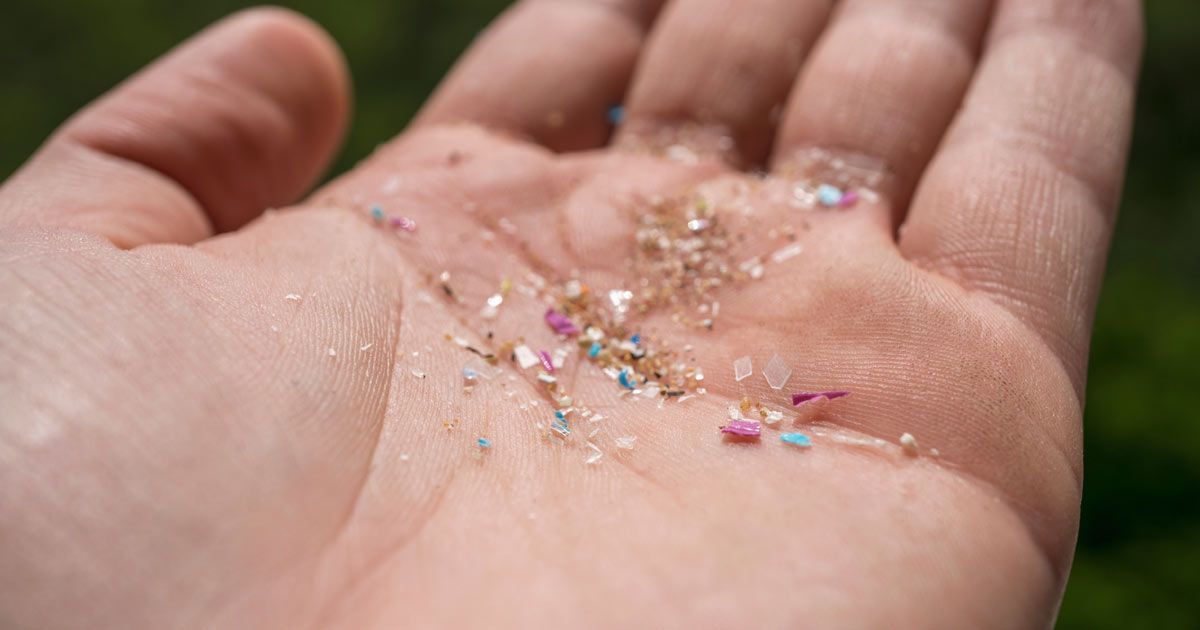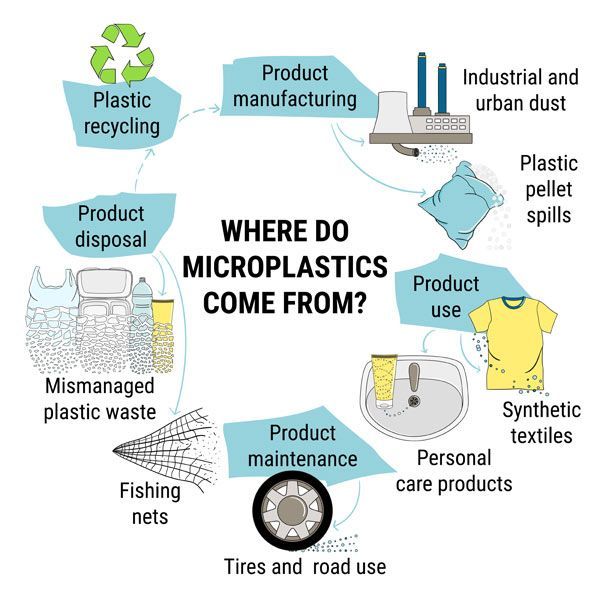Microplastic Toxicity Treatments NYC - Dr. John Salerno

Integrative and Complementary Microplastics Detection and Removal at Salerno Wellness in Manhattan, NY, and Connecticut
I realize how challenging it can be to cope with unexplained symptoms affecting your energy and overall health. You may feel frustrated, wondering what's behind your discomfort, but I want to assure you that I'm here to help. By focusing on functional and integrative approaches, my goal is to uncover the root cause of your symptoms, which may be related to microplastic toxicity, and develop a treatment plan tailored to your unique needs. Together, we can work toward improving your quality of life and helping you regain control over your health.
-Dr. John Salerno
What is Microplastic Toxicity?
Microplastic toxicity occurs when tiny plastic particles, often less than five millimeters in diameter, accumulate in your body. These particles originate from various sources, including personal care products, synthetic clothing fibers, and the breakdown of larger plastics in the environment. Once ingested or inhaled, microplastics can enter your bloodstream, lymphatic system, or even essential organs. This buildup has the potential to disrupt cellular processes and damage tissues over time.
Studies show that components of microplastics, like chemicals and additives, can leach into your body, causing inflammation, oxidative stress, and even hormonal imbalances. These effects not only compromise your immediate health but may also predispose you to chronic conditions.
Microplastics can act as carriers for bacteria and viruses, introducing harmful pathogens into your system. Given how pervasive plastic is in our modern world, virtually anyone can develop microplastic toxicity without realizing it. Identifying and addressing this hidden trigger is crucial for restoring balance in your body and preventing long-term complications.
Health Dangers of Microplastic Toxicity
Microplastics, tiny plastic particles less than 5 millimeters in size, have become a growing environmental and health concern. These particles are found in oceans, soil, air, and even the food and water we consume. While much of the focus has been on their environmental impact, increasing attention is being paid to the potential health dangers of microplastic toxicity. Here's an overview of the risks:
- Ingestion and Accumulation - Microplastics can enter the human body through food, water, and even air. Studies have found microplastics in seafood, salt, bottled water, and other consumables. Once ingested, these particles may accumulate in the digestive system and potentially enter the bloodstream, lymphatic system, or other organs.
- Chemical Contaminants - Microplastics often carry harmful chemicals, such as: Bisphenol A (BPA), A known endocrine disruptor that can interfere with hormone regulation. Phthalates are chemicals linked to reproductive and developmental issues. Persistent
- Organic Pollutants (POPs) are toxic substances that can accumulate in the body and cause long-term health effects. These chemicals can leach into the body, potentially leading to hormonal imbalances, immune system disruption, and other health issues.
- Inflammation and Cellular Damage - Microplastics can cause physical damage to cells and tissues. Studies suggest that exposure to microplastics may trigger: Inflammatory responses: The body may perceive microplastics as foreign invaders, leading to chronic inflammation. Oxidative stress: An imbalance between free radicals and antioxidants, which can damage cells and DNA.
- Respiratory Risks - Inhalation of airborne microplastics, such as those from synthetic fibers or industrial emissions, poses risks to respiratory health. These particles can lodge in the lungs, potentially causing respiratory irritation, reduced lung function, and increased risk of conditions like asthma or chronic obstructive pulmonary disease (COPD).
- Impact on Gut Microbiome - Microplastics may disrupt the gut microbiome, the community of beneficial bacteria in the digestive system. This disruption can lead to impaired digestion and nutrient absorption, increased risk of gastrointestinal disorders, and weakened immune response.
- Potential Carcinogenic Effects - While research is ongoing, some studies suggest that prolonged exposure to microplastics and their associated chemicals may increase the risk of cancer. This is due to their potential to cause DNA damage, oxidative stress, and chronic inflammation.
- Developmental and Reproductive Concerns - Microplastics and their chemical additives may interfere with reproductive health. For example, hormonal disruptions can affect fertility. Prenatal exposure may impact fetal development, potentially leading to long-term health issues in children.
- Neurological Effects - Emerging research indicates that microplastics may cross the blood-brain barrier, potentially affecting brain health. This could lead to: Cognitive impairments, Behavioral changes, Increased risk of neurodegenerative diseases.
- Mitigating the Risks - While it's impossible to completely avoid microplastics, steps can be taken to reduce exposure: Opt for glass or stainless steel over plastic containers. Avoid single-use plastics and microbead-containing products. Filter drinking water to remove potential microplastic contaminants.
The health dangers of microplastic toxicity are still being studied, but the evidence so far underscores the need for urgent action to address this growing issue. Reducing plastic use and pollution is not only vital for the environment but also for safeguarding human health.
Common Symptoms
Many individuals experiencing microplastic toxicity have no idea their symptoms are linked to this modern environmental challenge. The signs can vary widely and often mimic other conditions, making diagnosis difficult. Below are common symptoms and their detailed descriptions to help you better understand your body's signals.
- Chronic Fatigue: Unexplained exhaustion may persist despite adequate sleep or rest. This occurs as microplastics interfere with cellular energy production, leaving you feeling drained throughout the day.
- Brain Fog: Difficulty concentrating, forgetfulness, or mental sluggishness can be linked to microplastic-induced neurological inflammation. The interference of toxins with neurotransmitter function may worsen these symptoms over time.
- Digestive Issues: Irritation in the stomach or intestines, bloating, and irregular bowel movements might arise as microplastics disrupt the microbiome and damage the intestinal lining.
- Skin Problems: Persistent conditions like rashes, eczema, or acne can indicate toxin buildup, as the skin often reflects internal imbalances caused by microplastic exposure.
- Respiratory Discomfort: Shortness of breath or a chronic cough could result from inhaling airborne microplastic particles, which irritate and inflame lung tissue.
Common Causes
Microplastic toxicity stems from multiple factors associated with modern lifestyles. One common source is the widespread use of plastic-containing food packaging, leading to ingestion of microscopic particles. Additionally, cosmetics and personal care products, such as exfoliants or toothpaste, often contain microplastics, which are absorbed directly through the skin.
Synthetic fabrics like polyester release fibers into the air and water during washing, significantly contributing to microplastic exposure. Environmental pollution from industrial activities and the degradation of waste only worsens the prevalence of these tiny toxins. Another factor includes the fish and seafood that many of us consume, which may already be contaminated with microplastic particles from polluted water.
Cooking with plastic utensils or storing food in plastic containers can further leach microplastics into meals. For those using bottled water, studies reveal it sometimes contains higher levels of microplastic particles compared to tap water. Simply living in urban areas where plastic usage is ubiquitous can elevate exposure. Together, these sources create a cumulative burden that intensifies over a lifetime.
Related Medical Conditions That Can Be Treated at Salerno Wellness
Microplastic toxicity is often linked to a range of medical conditions that can benefit from targeted treatment. These conditions may emerge as microplastics compromise immunity, disrupt hormones, or damage tissues over time.
- Endocrine Disorders: Chemicals in microplastics, such as BPA, can mimic hormones, leading to imbalances like thyroid dysfunction or infertility. Tailored treatments aim to rebalance your natural hormone levels and restore optimal function.
- Autoimmune Diseases: Chronic exposure to toxins can overstimulate the immune system, increasing risks for autoimmune conditions such as rheumatoid arthritis or lupus. Functional therapies can help modulate immune responses.
- Chronic Inflammation: Persistent inflammatory markers often result from tissue irritation caused by microplastics. Anti-inflammatory protocols aim to repair damage and improve overall health.
- Neurological Conditions: Accumulating toxins can impact brain health, exacerbating conditions such as Alzheimer's or Parkinson's. Advanced treatments can support cognitive recovery and slow decline.

Candidates for Microplastics Treatment NYC and CT by Dr. John Salerno
If you're frequently exposed to environmental toxins or suffering from unexplained health issues, you may be an ideal candidate for treatment focusing on microplastic toxicity. Those experiencing chronic digestive disturbances, respiratory irritation, or recurring skin flare-ups should also consider evaluation. Patients with suspected hormone imbalances, fatigue, or mood swings may similarly benefit from targeted interventions. Even if you do not exhibit overt symptoms, being proactive can reduce long-term risks of severe chronic conditions.
Keeping track of your exposure, diet, and symptoms will help Dr. Salerno create a personalized pathway forward. Treatment is most effective when intervention starts early, before irreversible damage sets in. If conventional treatments have failed to alleviate your symptoms, integrative approaches designed by Dr. Salerno can provide the relief you're seeking. With over 30 years of experience, Dr. Salerno uses diagnostic tools to uncover overlooked causes and offer innovative solutions tailored to your unique biology.
How Conventional Medicine Treats Microplastic Toxicity
Traditional medicine often downplays or overlooks microplastic toxicity as a direct cause of health issues. Conventional treatments are typically symptom-focused, involving prescriptions for inflammation control, hormone replacement, or gastrointestinal disruptions. While such measures may provide short-term relief, they rarely address the underlying toxin buildup.
How Dr. John Salerno Treats Microplastic Toxicity
Dr. Salerno takes a comprehensive approach to restoring your health by identifying and removing microplastic toxins. Functional testing methods are used to detect toxins and gauge their impact on key systems in your body. Integrated detoxification protocols may include chelation therapies or natural supplements to bind and expel harmful particles.
By optimizing your liver and kidney functions, the body's natural detox pathways are enhanced. Nutritional interventions ensure that toxins are not only removed but that your body regains its essential nutrients. The unique treatments target both symptoms and root causes, offering long-term health benefits that go beyond surface-level fixes.
Possible Side Effects of Treatment
While rare, some patients may experience mild symptoms like fatigue or nausea as stored toxins are eliminated from the body. Flu-like symptoms might surface during detoxification as the body mobilizes toxins for removal. These effects are temporary and monitored to ensure patient comfort.
What Can Happen if Left Untreated?
If microplastics are left untreated in the environment and continue to accumulate in the human body, they can pose both short-term and long-term risks. In the short term, exposure to microplastics may lead to localized inflammation or irritation in tissues, particularly in the respiratory or gastrointestinal systems. This can result in discomfort, mild immune responses, or even allergic reactions in sensitive individuals.
In the long term, the consequences could be more severe. Microplastics have been found to carry toxic chemicals, such as pesticides and heavy metals, which can leach into the body and potentially disrupt hormonal systems, impair organ function, or contribute to chronic diseases.
The persistent presence of microplastics in ecosystems can harm biodiversity, disrupt food chains, and exacerbate pollution, creating a cycle of environmental degradation that ultimately impacts human health and well-being. While research is ongoing, these potential risks highlight the urgency of addressing microplastic pollution.
Why Patients Choose Dr. John Salerno
When it comes to choosing a healthcare provider, you want someone who truly puts your well-being first. Patients consistently turn to Dr. John Salerno for his exceptional expertise, compassionate care, and groundbreaking approach to health and wellness. Here's what makes him the trusted choice for so many:
Dr. Salerno is a renowned practitioner with years of experience in both traditional and integrative medicine. His extensive knowledge allows him to uncover underlying health issues that other providers might overlook. Whether it's managing chronic conditions or optimizing overall wellness, Dr. Salerno delivers care that blends the best of modern science with holistic approaches.
Your health is personal, and Dr. Salerno understands that. He takes the time to really listen to your concerns and works closely with you to create a personalized treatment plan. Every step of your care is designed with your unique needs, goals, and preferences in mind. At Dr. Salerno's practice, you're more than just a patient—you're a partner in your own health journey.
Dr. Salerno is passionate about staying at the forefront of medical advancements. His practice offers innovative, evidence-based treatments designed to promote optimal health. By integrating alternative therapies with traditional care, he provides effective solutions that go beyond simply addressing symptoms—he aims to help you achieve lasting health from the inside out.
Unique Practice Features
- Holistic Focus – Combining proven medical practices with natural therapies for complete body wellness.
- Root-Cause Diagnosis – Addressing the source of health issues rather than just treating symptoms.
- Warm, Welcoming Environment – Dr. Salerno and his team create a space where you feel comfortable, supported, and empowered at every visit.
Contact Dr. John Salerno For A Consultation on Microplastic Toxicity in Manhattan, NYC and Connecticut
Take the First Step Toward Better Health! Your health deserves the very best. Discover why so many patients trust Dr. John Salerno to guide their wellness journeys. Schedule an appointment today and experience truly personalized care that puts you first.
Please contact us today.
Additional References
- Microplastics: A Real Global Threat for Environment and Food Safety - National Library of Medicine
- Microplastics and Nanoplastics in Foods - Food and Drug Administration (FDA)




